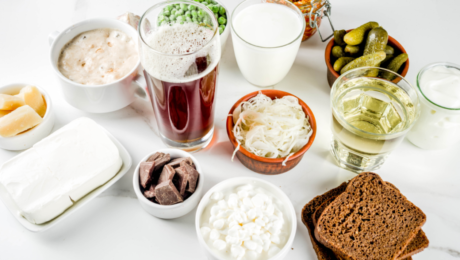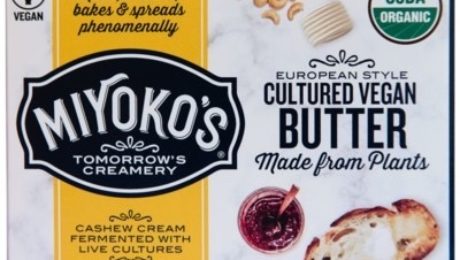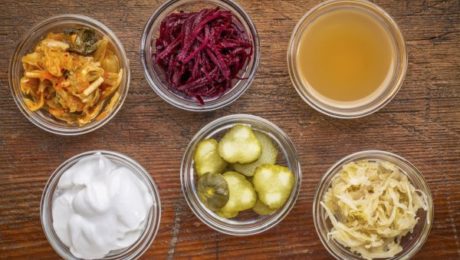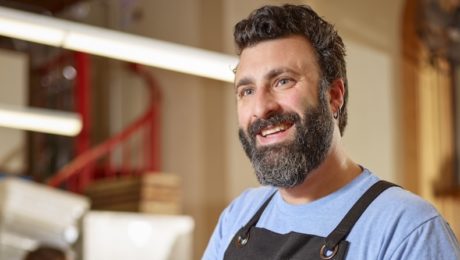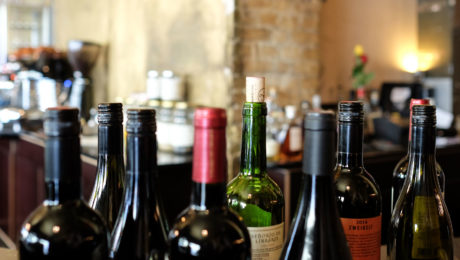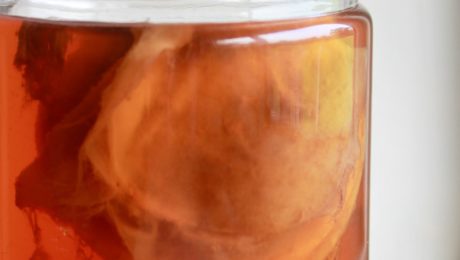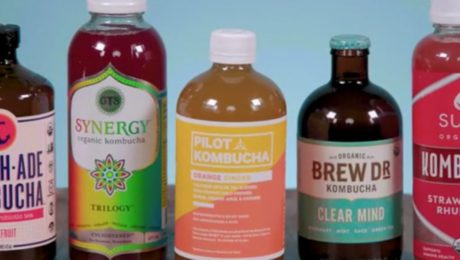New FDA Requirements for Fermented Food
By August, any manufacturer labeling their fermented or hydrolyzed foods or ingredients “gluten-free” must prove that they contain no gluten, have never been through a process to remove gluten, all gluten cross-contact has been eliminated and there are measures in place to prevent gluten contamination in production.
The FDA list includes these foods: cheese, yogurt, vinegar, sauerkraut, pickles, green olives, beers, wine and hydrolyzed plant proteins. This category would also include food derived from fermented or hydrolyzed ingredients, such as chocolate made from fermented cocoa beans or a snack using olives.
Read more (JD Supra Legal News)
Food and Beverage Laws Passed in 2020
Every year, the nation’s 50 state legislatures pass dozens of new laws that have an impact on fermenters. For example, some states amended alcohol laws to allow drink sampling for craft wineries, while others repealed outdated cottage food laws to help small producers operate and more loosened take-out restrictions to help small restaurants survive the pandemic.
Indicative of this year’s focus on the pandemic, laws were introduced but never debated as lawmakers focused on more pressing issues surrounding the coronavirus. The most common new laws passed in 2020 revolved around helping businesses survive — states called special sessions to aid restaurants, stop price gouging of high-demand products and provide emergency grants to small businesses.
Read on for key food, beverage and food service laws passed this year, most taking effect in 2021.
California
AB82 — Prohibits an establishment with an alcohol license from employing an alcohol server without a valid alcohol server certification.
AB3139 — Establishments with alcoholic beverages licenses who had premises destroyed by fire or “any act of God or other force beyond the control of the licensee” can still carry on business at a location within 1,000 feet of the destroyed premise for up to 180 days.
Delaware
HB 237 — Eliminates old requirements that movie theaters selling alcohol must have video cameras in each theater, and that an employee must pass through each theater during a movie showing.
HB275 — Permits beer gardens to allow leashed dogs on licensed outdoor patios.
HB349 — Permits any restaurant, brewpub, tavern or taproom with a valid on-premise license to sell alcoholic beverages for take-out or drive through food service, so long as the cost for the alcohol did not exceed 40% of the establishment’s total sales transactions.
Hawaii
SR84 — Creates a Restaurant Reopening Task Force to help restaurants in Hawaii safely reopen that were closed during the COVID-19 pandemic.
SR94 — Urges restaurants to adopt recommended best practices and safety guidelines developed by the United States Food and Drug Administration and National Restaurant Association in response to the COVID-19 pandemic.
Idaho
HB343 — Amends existing law to require licensing to store and handle wine as a wine warehouse.
HB575 — Allows sampling of alcohol products at liquor stores, which was formerly forbidden under law.
SB1223 — Eliminates obsolete restrictions on food products, to match federal standards. It repeals requiring extra labels on some imported food products, and repeals using enriched flour in bread baking.
Illinois
HB2682 — Amends Liquor Control Act of 1934. Allows a cocktail or mixed drink placed in a sealed container at the retail location to be sold for off-premises consumption if specified requirements are met. Prohibits third-party delivery services from delivering cocktails or mixed drinks.
HB4623 — Amends Food Handling Regulation Enforcement Act, regulating that public health departments provide a certificate for cottage food operations, which must be displayed at all events where the licensee’s food is being sold.
Iowa
HB2238 — Amends code regarding food stands operated by a minor. Bans a municipality from enforcing a license permit or fee for a minor under the age of 18 to sell or distribute food at a food stand.
Kentucky
HB420 — Implements Food Safety Modernization Act, authorizing a department representative to enter a covered farm or farm eligible for inspection.
SB99 — Amends alcohol laws for state’s distillers, brewers and small wineries. Eliminates the sunset on local precinct elections to grant distilleries, and allows distillers to sell other distiller’s products.
Louisiana
HR17 — Allows third-party delivery services to deliver alcohol.
HB136 — Makes adulterating a food product by intentional contamination a crime.
SB455 — Increases the size of containers of high-alcoholic beverages.
SB508 — Gives restaurants protection from lawsuits involving COVID-19. The public will be unable to sue restaurants for COVID-19-related deaths or injuries, as long as the restaurant complies with state, federal and local regulations about the virus.
Maine
LD1167 — Encourages state institutions to serve Maine food and Maine food products, increasing the visibility of the state’s local food producers.
LD1884 — Amends current laws regarding businesses that hold dual liquor licenses, which authorized retailers to sell wine for consumption both on- and off-premise. Retailers with the dual license can now sell with just one employee at least 21 years of age present, and adds that wine can be sold for take-out if food is part of the transaction.
Maryland
HB1017 — Allows cottage food businesses to put their phone number and business ID on their food label, rather than their address as currently required by the Maryland Department of Health.
SB118 — Expands definition of “alcohol production” and “agricultural alcohol production.” The new definitions aim to give Maryland farmers and producers the ability to sell beer, wine and spirits to increase agritourism.
Massachusetts
SB2812 — Expands alcohol take-out and delivery options during COVID-19 pandemic. Allows restaurants to sell mixed drinks in sealed containers alongside other take-out and delivery food orders.
Michigan
HB5343 — Revises regulations on brewpubs and microbreweries, increasing the quantity of beer a microbrewer is permitted to deliver to a retailer during a year from 1,000 barrels to 2,000 barrels.
HB5345 — Amends the Michigan Liquor Control Code to delete the Michigan Liquor Control Commission (MLCC) $6.30 tax levied on each barrel of beer manufactured and sold in Michigan.
HB5354 — Amends the Michigan Liquor Control Code to delete the requirement that a brewpub cannot sell beer in Michigan unless it provides for each brand or type of beer sold a label that truthfully describes the content of each container.
SB711 — Establishes new limited production brewer license for microbreweries at cost of $1,000 for license.
HB5356 — Amends the Michigan Liquor Control Code to ban the required $13.50 cent-per-liter tax on all wine containing 16% or less of alcohol by volume sold in Michigan.
Minnesota
HB5 — Authorizes emergency, small-business grants and loan funding for businesses affected by COVID-19.
HB4599 — Extends period of mediation for Minnesota farmers suffering economic difficulties to keep their farm.
Mississippi
HB326 — Amends outdated code to increase the maximum annual gross sales for a cottage food operation (from $20,000 to $35,000) before the producer would need to pay food establishment permit fees. Authorizes a cottage food operation to advertise products over the internet.
New Jersey
AB2371 — Requires large generators of food waste (like restaurants and supermarkets) to recycle food garbage rather than send it to incinerators or landfills.
AB3865 — Limits return of food from retail food stores during a public emergency.
SB864 — Prohibits sale of single-use plastic carryout bags, single-use paper carryout bags and polystyrene foam food service products, and limits single-use plastic straws.
SB1591 — Allows alcoholic beverages to be consumed from open containers in the Atlantic City Tourism District.
SB2437 — Limits service fees charged to restaurants by third-party food takeout and delivery applications during COVID-19 pandemic.
New Mexico
SB3 — Enacts the Small Business Recovery Act of 2020, which provides loans for small businesses suffering during the coronavirus pandemic.
New York
SB8225 — Authorizes issuing a retail license for on-premise consumption of food and beverage within 200 feet of a church, synagogue or other place of worship.
AB8956 — Allows a licensed brewery or farm brewery to provide no more than four beer samples not exceeding four fluid ounces each.
SB1472 — Requires hospitals to offer plant-based food options to patients upon request.
SB7013 — Authorizes the manufacture and sale of ice cream or other frozen desserts made with liquor.
North Carolina
SB290 — The Alcoholic Beverage Control Regulatory Reform Bills, it allows distilleries the same serving privileges as wineries and craft breweries and reduces regulation on out-of-state sales.
Ohio
HB160 — Aid for the restaurant industry to recover from COVID-19 pandemic, the bill doubles the maximum number of Designated Outdoor Refreshment Areas (DORAs) that can be created in a municipality or township. Also allows Ohio’s small wineries to sell prepackaged food without regulation from the Ohio Department of Agriculture, creates bottle limits for micro-distilleries and permits license holders to sell alcoholic ice cream.
South Carolina
HB4963 — Amends state alcohol code, allows licensed retailers to give wine samples in excess of 16% alcohol, cordials or distilled spirits, as long as they don’t exceed a total of three liters a year.
SB993 — Amends state alcohol code to allow a permitted winery to be eligible for a special permit to sell wine at off-premise events. Also increases the amount of beer a brewery can sell to an individual per day for off-premise consumption.
South Dakota
HB1073 — Authorize special event alcohol licenses for full-service restaurant licensees.
HB1081 — Allows colleges to teach brewing beer and wine classes on South Dakota campuses to students age 21 or older. Brewing must be held off campus as the education institution is not deemed a licensed manufacturer. Any distilled spirits, malt beverage, or wine produced under this section may only be consumed for classroom instruction or research and may not be donated or sold.
Tennessee
SB2423 — Allows alcohol sales at the Memphis Zoo.
SB1123 — Encourages farmers who produce raw milk to complete a safe milk-handling course.
Utah
HB134 — Legalizes the sale of raw butter and raw cream in Utah;
HB232 — An agri-tourism bill that allows farms and ranches to host events that include food that would not need to be prepared in a commercial kitchen. Farmers must apply for a food establishment permit to use their private home kitchen.
HB399 — Changes to the Alcohol Beverage Control Act, prohibits advertising that promotes the intoxicating effects of alcohol or emphasizes the high alcohol content of an alcoholic product.
HB5010 — The COVID-19 Cultural Assistance Grant Program, which appropriates $62 million for struggling arts, cultural and recreational organizations and businesses across the state.
HB6006 — In response to the coronavirus pandemic, the bill amends the Alcohol Beverage Control Act, delaying the expiration date of the retail licenses set to expire in 2020 for places selling alcohol. Also permits alcoholic beverage licensees at international airports to change locations if needed.
Vermont
SB351 — A coronavirus relief bill which authorizes $36 million for agriculture and forestry sectors.
Washington
HB2217 — An update to Cottage Food Law eliminates the requirement that a home address must be put on a food label.
HB2412 — Increases amount of additional retail licenses for a domestic brewery or microbrewery from two to four, and directs health department to adopt rules allowing brewery owners to allow dogs on brewery premise
SB5006 — Allows sale of wine by microbrewery license holders.
SB5323 — A bill eliminating single-use, plastic carry-out bags
SB5549 — Modernizing resident distillery marketing and sales restrictions. Allows distilleries to sell products off-premise, similar to breweries and wineries.
SB6091 — Continues work on the Washington Food Policy Forum, including support for small farms and increasing the availability of food grown in the state.
West Virginia
HB4388 — Removes outdated restrictions on alcohol advertising, limiting the Alcohol Beverage Control Commissioner’s authority to restrict advertising in certain advertising mediums, such as at sporting events and highway billboards.
HB4524 — Making the entire state “wet,” permitting the off-premises sale of alcoholic liquors in every county and municipality in the state.
HB4560 — Permits licensed wine specialty shops to sell wine with a gift basket by telephonic, electronic, mobile or web-based wine ordering. Establishes requirements for lawful delivery.
HB 4697 — Removes restriction that a mini-distillery use raw agricultural products originating on the same premises
HB4882 — Allows unlicensed wineries not currently licensed or located in West Virginia to provide limited sampling and temporary, limited sales for off-premise consumption at fairs, festivals and one-day nonprofit events “in hopes that such wineries would eventually obtain a permanent winery or farm winery license in West Virginia.”
Wisconsin
HB1038 — Bans customers from returning food items during a health pandemic or emergency, dissuading people from stocking up on too many supplies.
SB83 — Increases sales volume of alcohol by retail stores from four liters per transaction to any quantity.
SB170 — Allows minors to operate temporary food stands without a permit or license.
Wyoming
HB82 — Authorizes a microbrewery to operate at more than one location. The local licensing authority may require the payment of an additional permit fee not to exceed $100.00.
HB84 — Authorizes the sale of certain homemade food items that do not require time or temperature control. These include but are not limited to:
but is not limited to, jams, uncut fruits and vegetables, pickled vegetables, hard candies, fudge, nut mixes, granola, dry soup mixes excluding meat based soup mixes, coffee beans, popcorn and baked goods that do not include dairy or meat frosting or filling or other potentially hazardous frosting or filling;
“non-potentially hazardous” (no dairy, quiches, pizzas, frozen doughs, foods that require refrigeration and cooked meat, cooked vegetables and cooked beans). Allows someone other than the producer to sell the food, as long as food is not sold in a retail location or grocery store where similar food items are displayed or sold. Food must be labeled with “food was made in a home kitchen, is not regulated or inspected and may contain allergens.”
HB158 — Allows microbreweries to make malt beverages at multiple locations rather than one as deemed in current law.
Stopping “Sourfaux” in the UK
Artisan bread bakers in the UK are banding together for Sourdough September, pushing for new government legislation to stop the rise of “sourfaux” bread. Laws in the UK allow retailers to sell unwrapped bread loaves without displaying an ingredient list.
Writes the Real Bread Campaign organizer Chris Young: “In the hands of skilled Real Bread bakers, this longer, slower fermentation, allows lactic acid bacteria in the starter to cause changes in the dough that result in bread with a glossy crust and crumb, and a greater complexity of flavour and aroma.”
The UK government promised in 2018 to protect consumers from buying products erroneously label led as “sourdough.” But no action has been made. More than 50 UK bread bakeries have launched their own labeling promise, signing The Sourdough Loaf Mark scheme last month, urging all bread makers to display a full ingredient list.
Read more (Food Navigator)
- Published in Food & Flavor
Butter or Not?
A ruling has been issued on a lawsuit against the California Department of Food & Agriculture. It will be a landmark in the vegan (and fermented) food industry. A California judge said vegan dairy company Miyoko’s Kitchen can continue using the terms “butter,” “lactose-free” and “cruelty-free” on its packaging. The state’s food and agriculture department told Miyoko’s earlier this year that those terms could not be used on the vegan butter packaging because it was confusing to consumers. They said the term butter is restricted to products containing at least 80% milk fat. But Miyoko’s butter is a cashew cream fermented with live cultures. Miyoko’s also creates the natural flavor in their products by fermenting rosemary, plum and oregano.
“The state’s showing of broad marketplace confusion around plant-based dairy alternatives is empirically underwhelming,” wrote U.S. District Judge Richard Seeborg. Miyoko’s Kitchen, he wrote, is entitled to label its products as “butter” under the protection of the First Amendment. The case has still not been dismissed.
Read more (Food Dive)
- Published in Business
Defining “Gluten-Free”
The U.S. FDA released a final ruling on gluten-free labelling of fermented and hydrolyzed foods. The final rule covers yogurt, sauerkraut, pickles, cheese, green olives, FDA-regulated beers and wines and hydrolyzed plant proteins. Though gluten breaks down during fermentation and hydrolysis, the FDA says there are currently no valid, scientific, analytical methods to determine the gluten protein content in fermented or hydrolyzed food. To comply with gluten-free standards, the new FDA ruling requires food manufacturers to only use gluten-free ingredients before they undergo fermentation or hydrolysis.
“These new compliance requirements for labeling a product ‘gluten-free’ will protect individuals with celiac disease, an incurable, hereditary disorder that millions of Americans, including myself, live with,” said Alex M. Azar, secretary of the US Department of Health and Human Services. “The FDA’s final rule helps to ensure common products labeled ‘gluten-free’ really are gluten-free, equipping consumers to make the best choices for their health and their families.”
Read more (FDA)
- Published in Business
Umansky on Fermentation Regulations — “A Mess”
To the food and drink industry, regulators can sometimes feel like “the bad guys.” But to scale a fermentation brand, sell artisanal products at a farmers market, or serve dishes with fermented ingredients in a restaurant, producers need regulators to be friends or colleagues, says Jeremy Umansky, owner of Larder Deli and author of “Koji Alchemy.”
“As a fermented food producer, it’s a frustrating and almost difficult, like an intimidatingly difficult place to be in. Because there’s really no great resources of where to start, how to get going, how to do what you’re going to do in the safest manner possible while also maintaining a specific quality standard which is so important for us,” says Umansky. “We need to have open, honest conversation (with regulators). If your local regulators aren’t willing to work with you or just want to shut it down because they don’t understand, go up to the next level. Go up to the county, to your state or even reach out to federal. Because people are producing these foods all over the country, so there is regulation for them.”
Umansky spoke with Drew Anderson, CEO of Cleveland Kitchen, during a Fermentation Association webinar titled “Coping with Regulations (and Regulators).”
When Anderson started Cleveland Kitchen with his brother and brother-in-law, “the regulators didn’t really know how to handle fermented food.” They decided to become close with their representative from the Ohio Department of Agriculture and call her first when they moved to bigger facilities or added onto the facility. “She is fantastic. You involve the regulators into your process.”
“You’ve got to understand, when (regulators) go out, they know people don’t like them, they know they’re the enemy when they walk in that kitchen,” Anderson adds. “So if it’s a pleasure to work with you and they can see that they’re actually helping someone, that always helps. Food is still a people business. I think it’s important to be close.”
“It’s funny because the human race has been doing this for thousands of years and we never worried about it before. But now, in this modern age, everything has to be pasteurized.”
Fermenting was common in America before the 1920s, when electricity and refrigeration became a standard in homes. Today, with current food safety laws, “our regulation is more or less a mess,” Umansky notes.
“Anywhere you go in the world, for the most part, fermented foods are the crux at the root of any cuisine,” Umanksy says. “People have relied on these foods and the methods of making them for so, so long. And it’s interesting now that we have so much fear and intimidation and kind of unknowing about (fermented food) production and how they’re made and if they’re safe or not when we’ve kind of proven that society would not exist as it does if it weren’t for these foods prior to refrigeration.”
Both Cleveland Kitchen and Umansky’s Larder Deli are based in Cleveland. However, because Larder and Cleveland Kitchen produce and sell fermented foods differently, they are regulated by different associations. Larder is overseen by the city health department, and Cleveland Kitchen is overseen by the state health department.
“From locale to locale and oversight body to oversight body, things are different,” he says. “We’re both producing fermented foods, but because of how we’re producing them, where we’re producing them, and where we’re selling them, we have different sets of regulations. Same foods, different sets of regulations. And when you talk to different people, you get different answers.”
“Where is the regulation? It’s a mess. It’s almost impossible to keep up on it,” Umansky says.
There is not a standardized food code in all 50 U.S. states. Rules for retail food production varies from cities, counties and states. At the extreme opposite is Japan, where open-air food markets sell fermented foods with little government oversight over food producers.
“We have to be able to address this issue of there not being cohesion and they’re not being easily accessible information for those of us producing these types of food,” Umansky says. “It begs the question – why haven’t we taken a model from the Japanese or the Chinese? Or Scandinavian cuisine is very, very fermentation forward, Eastern European cuisine. Why haven’t we looked at their regulations?”
HACCP is another regulation setback for fermented food and drink producers. Hazard Analysis Critical Control Points (HACCP) are required plans that monitor food safety. But HACCP requires producers to make one thing the same way all the time. There is no room for variances in ingredients. It works for big, commercial producers.
“For smaller restaurants and craft producers, it’s essentially improbable,” Umansky says.
If there’s a menu change at a restaurant or a new ingredient source for a craft producer, technically a new HACCP plan is required.
Umansky recommends, when filing a HACCP, producers should pick one thing on the menu that will never change or that is always in stock. At Larder, it’s the pastrami sandwich with sauerkraut. Then, when it’s time to meet with a regulator, request someone familiar with craft food and come prepared with a HACCP covering the unchanged menu dish or stocked item.
“Your regulators will be so socked that you’ve already taken that step and they haven’t had to have this conversation with you,” he said. “The great thing is, in non-pasteurized fermented foods, I don’t even think there’s any reported cases of botulism associated with fermented foods. It can’t survive. There’s salt and acid.”
Check out the full video link here.
- Published in Business
New Tariffs Threaten Wine & Spirits Industry
Leaders of the wine industry are asking the community to rally and appeal tax hikes. As the industry continues reeling from losses related to COVID-19, a new round of potential tariff hikes threatens the industry. In 2020, a 25% tariff imposed on certain European wines and cheeses was described by some as the greatest threat to the wine and spirit industry since the prohibition era. U.S. President Donald Trump imposed the tariffs in retaliation for a tax imposed in France on several large American tech ferns, such as Facebook, Google and Airbus.
Read more (Vinepair)
- Published in Business
Colombian Government Declares “Sanitary Alert” Against Kombucha
INVIMA, Colombia’s National Food and Drug Surveillance Institute, released a “sanitary alert” against kombucha. The alert said: “It should be noted that ‘Scoby’ is an ingredient that has not been authorized by INVIMA for use in food and beverages.” INVIMA’s inspections found irregularities detected in locally-produced kombucha, and called out five Colombian and one U.S. kombucha brands for various “health situations,” like using the unapproved phrase “probiotic culture of Kombucha” on the label, conducting unauthorized alcohol fermentation and manufacturing the kombucha at a different address then what was provided to INVIMA. .
.
Kombucha Brewers International (@kombuchabrewers KBI) released a statement supporting kombucha brewers. The statement reads: “Kombucha is an incredibly safe product to brew at home as well as commercially. As a traditional fermented food, it’s microbial makeup and the organic acids it produces ensures that it is well preserved even without refrigeration. The role of fermented foods far precedes other types of preservation technology such as refrigeration, pasteurization or chemical preservatives. …Colombia has a long history of using fermented foods to provide nutrient dense foods for their native population. Cassava, cacao and maize have all been fermented through traditional processes to create almidón agrio, chicha, champús, masa agria, guarapo and many more.”
Read more (KBI)
- Published in Science
What Fermenters Need to Know About Probiotics Regulations
Probiotics are the third most popular health product ingredient, with 62% of American consumers buying or wanting to buy them. However, only one-third of consumers say they understand probiotics. That confusion is evident in the courts, where consumer class action lawsuits are continually filed against probiotic food and beverages.
Meanwhile, the probiotics industry is pushing to update 25-year-old dietary supplement laws, there’s a new head of the Food and Drug Administration (FDA) and the lactobacillus taxonomy has been overhauled.
What does all this mean for fermented food and beverage brands? Ivan Wasserman, an attorney with expertise in foods and dietary supplements, says now is the time to plan for legal roadblocks, whether a new product or an existing brand. Wasserman shared his legal expertise during a Natural Products Insider webinar on probiotics regulations and class-action lawsuits.
How Does the FDA Define Probiotics?
It wasn’t until 1994 that probiotics were allowed to be sold as an FDA-approved dietary supplement. But the Dietary Supplement and Health Education Act (DSHEA) of 1994 does not directly define probiotics in their definition of supplements.
“You’ll notice there’s nothing in there about live microorganisms,” Wasserman says.
A line interpreted as a “catch-all” provision covers probiotics. It says a dietary substance can be anything “to supplement the diet by increasing the total dietary intake.” The FDA reviewed DSHEA in 2019, but new draft guidelines don’t provide additional clarification. The draft states: “Bacteria that have never been consumed as food are unlikely to be dietary ingredients.”
Wasserman says that’s not a correct assessment of probiotics. During the review, he noted government leaders who were around during DSHEA’s first passing said dietary supplement should not “be limited to things that are already in the food supply. That would really kill innovation, new strains of probiotics for example that were never in the food supply. It didn’t make sense to them that that would be the intent of congress. It would stifle innovation.”
As the FDA’s time is overwhelming focused on coronavirus, there has been no resolution to the definition of probiotics.
What are the Challenges in Labeling Probiotics?
Current regulations call for labeling probiotics in terms of weight. There is no special provision for live microorganisms; probiotics must be labelled like a vitamin or mineral.
“Unlike milligrams of calcium or vitamin C, we all know weight really isn’t that relevant (for probiotics) because dead bugs have weight, the size of the bug really doesn’t affect its efficacy,” Wasserman says. “It’s really how many live microorganisms you’re getting taking as part of a dietary supplement. That’s how all research is published, that’s how the government refers to it. So CFUs, or colony forming units, has become sort of a defacto way consumers and companies will recognize how much of a live microorganism a probiotic is in a live, dietary supplement.”
The International Probiotics Association petitioned the FDA on this measurement rule, asking for probiotics to be listed in terms of CFUs, not milligrams. The FDA said yes, CFUs would be allowed, but milligrams must also be included.
“It’s just confusing and silly,” Wasserman says.
False Advertising Claims Can Cost Brands Millions
In the past decade, the Federal Trade Commission (FTC) has actively sent warnings to brands making unverified probiotic health claims. The FTC’s first charge for probiotic advertising was filed in 2010 against Nestle BOOST Kid Essentials. Nestle did not have the scientific evidence to back up their health labelling. The FTC said Nestle used “deceptive advertising claims about the health benefits of the children’s drink,” like claiming it would reduce the risk of colds, flu and other respiratory tract infections, claims unproven by the FDA. Nestle also claimed BOOST would reduce children’s sick-day absences and decrease the duration of diarrhea, claims unverified “by at least two well-designed human clinical studies,” the FTC said.
“You have to be extremely careful not to imply or state disease prevention,” Wasserman says. “Probiotics certainly give a boost to the immune system, but…to the FTC, that was too strong of a claim, that this product can literally prevent children from getting sick. You can get in trouble for both imagery and claims. Be very careful.”
Other deceptive advertising cases include:
- In 2010, the largest truth in advertising lawsuit was settled against Dannon yogurt. Dannon claimed their Activia and DanActive yogurt products were “clinically” and “scientifically proven” to regulate digestion and boost the immune system. However, Dannon never proved their claims. Dannon had to pay $45 million in damages, and remove the words “clinically” and “scientifically proven” from their labels.
- In 2018, a class-action lawsuit was filed against Tropicana for marketing the added health benefits in their Essentials Probiotics fruit juices. The drink, though, included nearly the same amount of sugar as soda, and Tropicana did not have adequate scientific evident to support the nutritional claims.
- In 2019, a lawsuit was filed against Brew Dr Kombucha, alleging the kombucha was “falsely advertised and labeled as having a significantly higher amount of probiotic bacteria than the products sold actually contained.” Brew Dr’s kombucha bottle advertised billions of bacteria per bottle, but the plaintiff’s research found only 50,000 CFU’s of probiotic bacteria per bottle. The case is still pending.
- In May 2020, the National Advertising Division (NAD) recommended Benefiber remove the claims “100% natural,” “clinically proven to curb cravings” and “helps you feel full longer” from the Benefiber fiber supplements. Metamucil challenged Benefiber’s claims. Though Benefiber had tested their products and could provide scientific evidence, the NAD said the studies were not relevant to the consumer population. Benefiber’s studies were conducted on factory workers in China who live in a controlled living environment at the warehouse 24/7.
In the last few years, the FTC has been relatively quiet filing warnings against probiotic products. Wasserman theorizes it’s because the benefits of probiotics to digestive health have become well-accepted to the general public. Class-action lawsuits filed against probiotic products have also slowed down.
“That’s not to say they’re not being filed,” Wasserman adds. “We’re not seeing a letdown of those types of letters. Our little law firm is dealing with them on a daily basis for a wide variety of clients in a wide variety of industries. The good news is, because the benefits are so well known of probiotics, we haven’t seen a lot of cases actually being filed against probiotics.”
- Published in Science
How Kombucha Became a Tea Empire
CNBC “Suddenly Obsessed” explores how kombucha went from a niche beverage to a massive fermented drink category reaching $500 million in sales. Once only popular among hardcore health enthusiasts, CNBC notes kombucha’s appeal is because of a growing consumer preference for healthier drinks. Bigger brands are entering the kombucha space, though, manipulating the brewing process. Pepsi Co. acquired Kevita kombucha, for example, and now Kevita pasteurizes their kombucha for a longer shelf life.
Read more (CNBC)
- Published in Business

